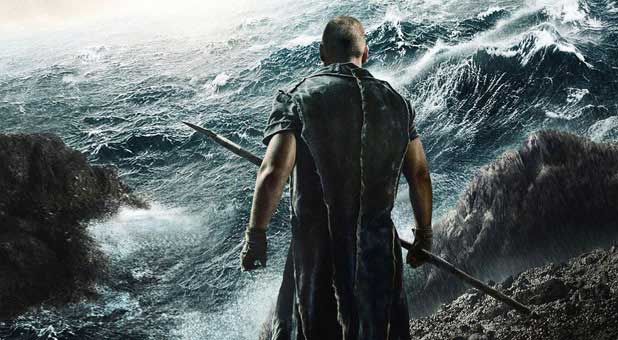I wanted to like the new film until I realized it wasn’t based on the Bible.
It’s been more than a week since I saw the new movie Noah, and I’m still scratching my head—and reading Genesis to clear my brain. Not since The Last Temptation of Christ in 1988 has Hollywood so irreverently botched a Bible story. It’s too bad there’s no refund policy at the Cineplex.
I wanted Noah to be good. We could use a loud reminder that God destroyed the world thousands of years ago with a flood. Shame on me for expecting Hollywood to get the story right. Despite some amazing special effects, a talented cast and a full-scale replica of Noah’s ark, the film is convoluted, bizarre and blasphemous.
I guess we shouldn’t be surprised. Noah’s director, Darren Aronofsky, told The New Yorker that his movie is “the least-biblical biblical film ever made.” His goal all along was to create an alternative version of the Genesis story—one that is more in line with ancient gnostic heresies than with the Bible. And when Paramount Pictures pressured Aronofsky to re-edit the film to please evangelical Christians, he refused.
On the bright side, at least there are thousands of people around the world who are now talking about a Bible story they weren’t familiar with. If you happen to get into a conversation about Noah, I hope you’ll help them understand the difference between the true account and this strange Hollywood version. Here are seven of the biggest blunders made in the new movie:
1. Noah wasn’t distant from God. In Aronofsky’s film, Noah (played by Russell Crowe) is a tortured soul who senses through a dream that the mysterious “Creator” (He is never called God) plans to destroy the world with a flood. But in Genesis 6-8, much of the account involves direct communication from God to Noah (see 6:13; 7:1; 8:15). Noah was God’s close friend, and he understood Him.
2. Noah didn’t drink hallucinogenic tea to hear God’s directions. In the film, Noah visits his grandfather, Methuselah (Anthony Hopkins), who helps him understand that a global catastrophe is coming. Genesis 6 says God revealed this plan directly to Noah, yet in Aronofsky’s version, Methuselah serves Noah some dark tea (or was it coffee?) to help him hear the Creator’s voice. Nobody in the Bible—ever—had to take a drug or a potion to hear from God, and Noah certainly never visited a shaman.
3. Noah’s sons weren’t without wives on the ark. In Aronofsky’s fanciful version, only one of Noah’s sons, Shem, has a wife (played by Emma Watson)—and she ends up pregnant with twin girls who, we assume, will eventually become wives for Noah’s other two sons. Huh? In the Genesis account, God tells Noah: “You shall enter the ark—you and your sons and your wife, and your sons’ wives with you” (Gen. 6:18).
4. There were no stowaways on the ark. Aronofsky adds preposterous drama to Noah by having the evil warlord Tubal-Cain (Ray Winstone) sneak on board the ark and hide in the shadows near sleeping bears and goats. He then attempts to kill Noah with the help of Noah’s son Ham—who is angry that his dad didn’t arrange to find him a wife before the rain started.
5. Noah didn’t get help from giant rock creatures when he built the ark. Aronofsky borrowed this weird concept from ancient Jewish mystics who suggested that the angels God cast out of heaven after creation were encased in rock and walked around helping human beings. In Noah, the giants, called “watchers,” chop down the wood for the massive ark and defend it from an invading army. All this made for some great digital effects, but the Bible says God cast these disobedient angels into hell (2 Pet. 2:4), not to earth, and they certainly weren’t sent here to help mankind.
6. Noah was not a deranged killer bent on stopping his family from reproducing. The second half of Noah was the worst part. After the flood begins, the man God uses to save all animals and humans from destruction decides God doesn’t want the human race to survive. He becomes a psychopath and threatens to kill his daughter-in-law’s child when she gives birth! The biblical Noah would never have tried to prevent repopulation. Noah understood he and his family had been commissioned to replenish the earth (Gen. 9:1).
7. The descendants of Adam did not treat the skin of a serpent as a family heirloom. Noah gets downright creepy whenever a character pulls out this snakeskin talisman. These scenes prove that Aronofsky based his film not so much on the biblical account of the flood but on gnostic writings. Centuries ago, some Jewish mystics taught that the God of Genesis was really a loser and that Satan was a better god. The subtle implication is that Noah needed Satan’s help, not God’s.
At the end of the flood story in Genesis, Noah gathers his family around the altar for worship, and they enter into a covenant with Him. But in the movie, just before the rainbow appears, Noah wraps the snakeskin around his arm and blesses his family with it. In a similar way, this film is wrapped in a serpent’s skin—and that’s why I will be more cautious next time when a Hollywood studio tries to get Christians to buy tickets to their “biblical” blockbuster.
J. Lee Grady is the former editor of Charisma. You can follow him on Twitter at @leegrady. He is the author of 10 Lies the Church Tells Women and other books.








































